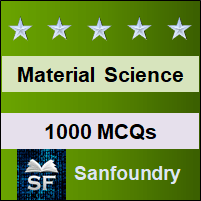
Materials Science Multiple Choice Questions Highlights
- 1000+ Multiple Choice Questions & Answers (MCQs) in Materials Science with a detailed explanation of every question.- These MCQs cover theoretical concepts, true-false(T/F) statements, fill-in-the-blanks and match the following style statements.
- These MCQs also cover numericals as well as diagram oriented MCQs.
- These MCQs are organized chapterwise and each Chapter is futher organized topicwise.
- Every MCQ set focuses on a specific topic of a given Chapter in Materials Science Subject.
Who should Practice Materials Science MCQs?
– Students who are preparing for college tests and exams such as mid-term tests and semester tests on Materials Science.- Students who are preparing for Online/Offline Tests/Contests in Materials Science.
– Students who wish to sharpen their knowledge of Materials Science Subject.
- Anyone preparing for Aptitude test in Materials Science.
- Anyone preparing for interviews (campus/off-campus interviews, walk-in interview and company interviews).
- Anyone preparing for entrance examinations and other competitive examinations.
- All - Experienced, Freshers and College / School Students.
Materials Science Chapters
Here's the list of chapters on the "Materials Science" subject covering 100+ topics. You can practice the MCQs chapter by chapter starting from the 1st chapter or you can jump to any chapter of your choice.- Atomic Structure and Interatomic Bonding
- Structure of Crystalline Solids
- Imperfections in Solids
- Diffusion
- Mechanical Properties of Metals
- Dislocations and Strengthening Mechanisms
- Failure
- Phase Diagrams
- Phase Transformations in Metals
- Applications and Processing of Metal Alloys
- Structures and Properties of Ceramics
- Applications and Processing of Ceramics
- Polymer Structures
- Characteristics, Applications and Processing of Polymers
- Composites, Corrosion and Degradation of Materials
- Electrical and Thermal Properties
- Magnetic and Optical Properties
1. Atomic Structure and Interatomic Bonding
The section contains multiple choice questions and answers on materials classification, atomic structure terminology, atomic models, atomic bonding in solids and elements periodic table.
|
|
|
2. Structure of Crystalline Solids
The section contains questions and answers on crystals properties, bravais lattices, fcc 7 hcp metallic crystals, crystallographic directions, braggs law and amorphous solids.
|
|
|
3. Imperfections in Solids
The section contains MCQs on crystallographic defects classification, point and linear defects, interfacial defects and microscopic examination.
|
|
|
4. Diffusion
The section contains multiple choice questions and answers on diffusion mechanisms, influential factors, steady and non-steady state diffusion.
|
|
|
5. Mechanical Properties of Metals
The section contains questions and answers on stress and strain, tension and compression tests, torsional tests, stress transformation, mechanical properties, design and safety factors.
|
|
|
6. Dislocations and Strengthening Mechanisms
The section contains MCQs on dislocations concept, lattice strain, slip systems, strengthening mechanisms, recovery and grain growth.
|
|
|
7. Failure
The section contains multiple choice questions and answers on failure fundamentals, ductile and brittle fracture, fracture mechanics, fatigue, fraacture tests, creep and high temperature alloys.
|
|
|
8. Phase Diagrams
The section contains questions and answers on phase diagrams, unary and binary phase diagrams, eutectic systems, eutectoid and peritectic reactions, gibbs phase rule and iron carbon systems.
|
|
|
9. Phase Transformations in Metals
The section contains MCQs on phase transformations in kinetics and iron carbon systems, time temperature transformation curves, iron carbon alloys and cooling transformation diagrams.
10. Applications and Processing of Metal Alloys
The section contains multiple choice questions and answers on metal alloys types, steels, cast irons, non ferrous alloys, steels heat treatment, metal fabrication and thermal processing techniques.
|
|
|
11. Structures and Properties of Ceramics
The section contains questions and answers on ceramics crystal structure, silicate ceramics, carbon, ceramics phase diagrams, stress strain behavior and ceramics fractures.
|
|
|
12. Applications and Processing of Ceramics
The section contains MCQs on ceramics types, glass ceramics, refractories, clay products, cements and advanced ceramics.
|
|
|
13. Polymer Structures
The section contains multiple choice questions and answers on hydrocarbons, polymer molecules, polymers classification and molecular weight, polymer crystals, polymer defects and polymeric materials diffusion.
|
|
|
14. Characteristics, Applications and Processing of Polymers
The section contains questions and answers on stress strain behavior, viscoelastic deformation, polymers fractures, glass transition, commercially polymers, advanced polymeric materials, polymerization techniques, fabrication and forming of polymers.
|
|
|
15. Composites, Corrosion and Degradation of Materials
The section contains MCQs on combined action principle, particle reinforced composites, fiber reinforced polymers, structural composites, corrosion chemistry, corrosion forms, rate and prevention.
|
|
|
16. Electrical and Thermal Properties
The section contains muliple choice questions and answers on electrical conduction, semiconductivity, dielectric behavior, semiconductor devices, ceramics and polymers electrical properties, heat capacity, thermal conductivity, thermal expansion and stresses.
|
|
|
17. Magnetic and Optical Properties
The section contains questions and answers on magnetism and its forms, hard and soft magnetic materials, hysteresis, magnetic storage, superconductivity, electromagnetic radiation, light interaction with solids and optical phenomena applications.
|
|
|
Wish you the best in your endeavor to learn and master Materials Science!
